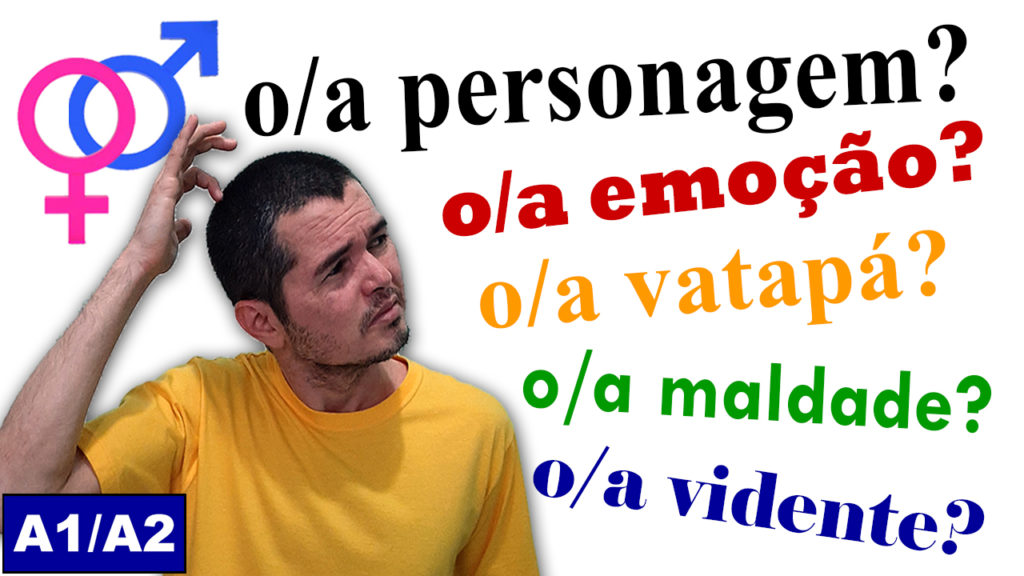In this article you will find:
- PDF with the conjugation of the 40 most used verbs.
- MP3 with the conjugation of the 40 most used verbs.
- Sentences illustrating the different meanings of each verb.
- List of the 100 most used verbs.
- The best website for conjugating verbs in Portuguese.
The journey of learning Portuguese can be exciting, but also challenging. To help you along this path, I present the key to unlocking communication: the 100 most used verbs in the Portuguese language!
Why is mastering these verbs so important?
- Essential Communication: These verbs form the basis of the Portuguese language, allowing you to express yourself in different everyday situations more easily.
- Quick Improvement: Focusing on the most frequent verbs drives you to more efficient learning, allowing you to reach a satisfactory level of communication in a short space of time.
- Strategic Focus: Focus your efforts on the verbs that really matter, optimizing your time and achieving faster results.
Start with the 40 most used verbs
These verbs are classified by order of importance and frequency. Therefore, ser, estar, ter and fazer are the four most used verbs in the Portuguese language.
Take my word for it, mastering these 40 verbs first will make everything easier later.
- ser – be (irregular)
- estar – be (irregular)
- ter – have (irregular)
- fazer – make/do (irregular)
- ir – go (irregular)
- querer – want (irregular)
- poder – can (irregular)
- dar – give
- ficar – stay, get
- dever – must, owe, should
- dizer – say (irregular)
- falar – speak
- achar – think, find
- precisar – need
- saber – know (irregular)
- deixar – let, leave
- colocar – put, place
- passar – pass, spend, pass by…
- ver – see (irregular)
- vir – come (irregular)
- conseguir – get, menage (irregular)
- pegar – take, pick up, grab
- botar – put
- sair – leave, go out (irregular)
- gostar – like
- começar – start, begin
- trazer – bring (irregular)
- acabar – end, finish
- levar – take, carry
- terminar – end, finish
- conhecer – know, meet, get to know
- ouvir – hear
- entender – understand
- chegar – arrive, be enough
- pedir – ask, order (irregular)
- perguntar – ask a question
- encontrar – find, discover
- tentar – try
- pôr – put (irregular)
- haver – there to be, exist (irregular)
Phrases with the 40 most used verbs
1 – SER (BE) – IRREGULAR
- Eu sou feliz. – I am happy.
- Ela é inglês. – He is English.
- Você é professor. – You are a teacher.
2 – ESTAR (BE) – IRREGULAR
- Estou cansado. – I am tired.
- Nós estamos em Portugal. – We are in Portugal.
- Você está doente. – You are sick.
3 – TER (HAVE, THERE IS/ARE) – IRREGULAR
- Eu tenho um cachorro. – I have a dog.
- Ela tem 30 anos. – She’s 30 years old.
- “Aqui, tem várias mesas”. – Here, there are several tables. (Real-life Portuguese 🎦)
4 – FAZER (DO, MAKE, STUDY/ATTEND) – IRREGULAR
- Vou fazer um bolo para o aniversário. – I will make a cake for the birthday.
- Você pode me fazer um favor? – Can you do me a favor?
- “Decidi: vou fazer fazer medicina” – I decided: I’ll study medicine. (Real-life Portuguese 🎦)
5 – IR (GO) – IRREGULAR
- Nós vamos para casa agora. – We go home now.
- Eu vou viajar mais tarde. – I’m going to travel later.
6 – QUERER (WANT) – IRREGULAR
- Ela quer um vestido novo. – She wants a new dress.
7 – PODER (CAN) – IRREGULAR
- Ele pode ajudar você com isso. – He can help you with that.
8 – DAR (GIVE, BE POSSIBLE) – IRREGULAR
- Ele sempre me dá boas sugestões. – He always gives me good suggestions.
- “Não dá pra medir”. – “It’s not possible to measure”. (Real-life Portuguese 🎦)
9 – FICAR (STAY, GET)
- Ele fica em casa no fim de semana. – He stays at home on the weekend.
- Eu fico triste quando vejo essas coisas. – I get sad when I see these things
10 – DEVER (MUST, SHOULD, OWE)
- Eu devo estudar para minha prova. – I must study for my test.
- Ele deve estar doente. – He must be sick.
- Você deve respeitar as regras da escola. – You should respect the school rules.
- Nós devemos ser gratos por tudo que temos. – We should be grateful for everything we have.
- Ela deve um favor ao seu amigo. – She owes her friend a favor.
11 – DIZER (SAY) – IRREGULAR
- Ela sempre diz a verdade. – She always tells the truth.
12 – FALAR (SPEAK)
- Eu falo português fluentemente. – I speak Portuguese fluently.
13 – ACHAR (FIND, THINK)
- Você sempre acha as melhores soluções. – You always find the best solutions.
- Ela acha que você está certo. – She thinks you’re right.
14 – PRECISAR (NEED)
- Eu preciso ir. – I need to go..
15 – SABER (KNOW, CAN, KNOW HOW TO) – IRREGULAR
- Você sabe muito mais que eu. – You know much more than me.
- Eu sei nadar. – I can swim.
- “Hoje ele sabe ler.” – Today he knows how to read. (Real-life Portuguese 🎦)
- Ela sabe tocar piano. – She knows how to play the piano.
16 – DEIXAR (LET, LEAVE, ALLOW)
- Deixe-me explicar o que aconteceu. – Let me explain what happened.
- Deixe as chaves sobre a mesa. – Leave the keys on the table.
- O policial não deixou ninguém entrar. – The policeman didn’t let anyone in
17 – COLOCAR (PUT, PLACE, PUT ON)
- Eu vou colocar as chaves na mesa. – I’ll put the keys on the table.
- Ela colocou as flores no vaso. – She placed the flowers in the vase.
18 – PASSAR (PASS, SPEND, PASS BY…)
- Eu preciso passar neste teste. – I need to pass this test.
- “O tempo passa rápido!” – Time passes quickly! (Real-life Portuguese 🎦)
- Passe-me o controle remoto, por favor. – Pass me the remote control, please
- Nós vamos passar a semana neste hotel. – We’re going to spend the whole week at this hotel.
- Eu vou passar na sua casa depois do trabalho. – I’ll pass by your house after work
19 – VER (VER) – IRREGULAR
- Eu vejo muitas estrelas no céu. – I see many stars in the sky.
20 – VIR (COME) – IRREGULAR
- Olhe quem veio nos visitar! – Look who came to visit us!
- Nós vimos aqui todo domingo – We come here every Sunday.
21 – CONSEGUIR (GET, MENAGE) – IRREGULAR
- Ela conseguiu um novo emprego. – She got a new job.
- Eu consegui encontrar uma solução para o problema. – I managed to find a solution to the problem.
22 – PEGAR (TAKE, CATCH, GRAB…)
- Ele vai pegar o ônibus para ir ao trabalho. – He’s going to take the bus to go to work.
- A casa pegou fogo! – The house caught fire!
- “Dá pra pegar Covid assim?”. – Is it possible to catch Covid like this? (Real-life Portuguese 🎦)
- A polícia pegou o suspeito. – The police grabbed the suspect.
- Vou pegar um livro na biblioteca. – I’ll grab a book from the library.
23 – BOTAR (PUT, PUT ON)
- Precisamos botar mais lenha na fogueira. – We need to put more firewood in the fire.
- “Eu vou botar um óculos de proteção.” – I’m going to put on protective glasses. (Real-life Portuguese 🎦)
24 – SAIR (LEAVE, GO OUT) – IRREGULAR
- Eles saem cedo para o trabalho. – They leave early for work.
- Ela gosta de sair com os amigos. – She likes to go out with friends.
25 – GOSTAR (LIKE)
- Você gosta de estudar? – Do you like to study?
- Ele gosta de você. – He likes you.
26 – COMEÇAR (START, BEGIN)
- Ela começa a trabalhar às nove horas. – She starts working at nine o’clock.
- Que comecem os jogos! – Let the games begin!
- A aula começa que horas? – What time does class start?
27 – TRAZER (BRING) – IRREGULAR
- Você pode trazer as bebidas para a festa? – Can you bring the drinks for the party?
28 – ACABAR (END, FINISH, PUT AN END TO)
- “Você tem que acabar com o vício.” – You have to end the addiction. (Real-life Portuguese 🎦)
- A reunião acabou mais cedo que o esperado. – The meeting ended earlier than expected.
- Eu acabo meu trabalho às cinco horas. – I finish my work at five o’clock.
- O sistema de segurança vai acabar com os furtos na loja. – The security system will put an end to thefts in the store.
29 – LEVAR (TAKE, CARRY)
- Não leve a vida tão a sério. – Do not take life so seriously.
- Ela vai levar o cachorro para passear no parque. – She will take the dog for a walk in the park.
30 – TERMINAR (END, FINISH)
- O filme vai terminar em breve. – The movie is going to end soon.
- Vamos terminar o jantar e ir para casa. – Let’s finish dinner and go home.
UNLOCK YOUR PORTUGUESE WITH MY COURSES
31 – CONHECER (KNOW, MEET, GET TO KNOW)
- Nós conhecemos muito bem esta cidade. – We know this city very well.
- Ontem eu conheci uma pessoa muito interessante. – Yesterday, I met a very interesting person.
- Viajar nos permite conhecer diferentes culturas. – Traveling allows us to get to know different cultures.
- Nós queremos as novidades deste software. – We want to get to know the new features of this software.
32 – OUVIR (HEAR) – IRREGULAR
- Você ouve o som dos pássaros? – Do you hear the sound of birds?
33 – ENTENDER (UNDERSTAND)
- Eu não entendo o que ele diz. – I don’t understand what he says.
34 – CHEGAR (ARRIVE)
- Que horas seu pai vai chegar? – What time will your father arrive?
35 – PEDIR (ASK, ORDER)
- Eu quero pedir um favor para você. – I want to ask you a favor.
- Eles pediram uma pizza grande para o jantar. – They ordered a large pizza for dinner.
36 – PERGUNTAR (ASK A QUESTION) – IRREGULAR
- Ela perguntou onde eu morava. – She asked where I lived.
37 – ENCONTRAR (FIND, MEET)
- Eu encontrei meu celular debaixo da cama. – I found my cell phone under the bed.
- Nós encontramos o Paulo na praia. – We met Paulo on the beach.
38 – TENTAR (TRY)
- Eles estão tentando aprender português. – They are trying to learn Portuguese.
39 – PÔR (PUT, PUT ON) – IRREGULAR
- Ela vai pôr o bolo no forno. – She’ll put the cake in the oven.
40 – HAVER (THERE TO BE) – IRREGULAR
- Há muitas pessoas na festa. – There are many people at the party.
- “Não há problema nenhum.” – There’s no problem at all. (Real-life Portuguese 🎦)
The 100 most common verbs in Portuguese
- abrir – open
- acabar – finish, end
- achar – think, find
- acontecer – happen
- acordar – wake up
- ajudar – help
- andar – walk/ride
- aparecer – appear, show up
- aprender – learn
- arrumar – arrange, tidy up, get
- assistir – watch
- beber – drink
- botar – put, place
- chamar – call, call out
- chegar – arrive
- colocar – put
- começar – start, begin
- comer – eat
- comprar – buy
- conhecer – meet, know
- conseguir – get, manage (irregular)
- contar – count, tell
- conversar – talk
- cozinhar – cook
- dar – give (irregular)
- deixar – leave, allow
- descobrir – discover, find out (irregular)
- descer – go down, descend
- dever – owe, must
- dizer – say (irregular)
- dormir – sleep (irregular)
- encontrar – find
- entender – understand
- entrar – enter
- entregar – deliver
- escrever – write
- escutar – listen
- esperar – wait, hope
- esquecer – forget
- estar – be (irregular)
- existir – exist
- explicar – explain
- falar – speak
- faltar – lack, miss
- fechar – close
- ficar – stay, become (irregular)
- funcionar – work, function
- ganhar – win, earn
- gostar – like
- haver – there to be (irregular)
- ir – go (irregular)
- jogar – play, throw
- lembrar – remember
- levantar – get up
- levar – take/carry
- ligar – call/turn on
- limpar – clean
- mandar – send/order
- morar – reside/live
- mostrar – show
- mudar – change
- olhar – look
- ouvir – hear (irregular)
- pagar – pay
- parar – stop
- parecer – seem
- passar – pass/stop by
- pedir – ask (irregular)
- pegar – take
- pensar – think
- perder – lose
- perguntar – ask
- poder – can/may
- pôr – put (irregular)
- precisar – need
- preocupar – worry
- procurar – search for
- querer – want (irregular)
- receber – receive
- responder – answer
- saber – know (irregular)
- sair – leave (irregular)
- sentar – sit
- sentir – feel (irregular)
- ser – be (irregular)
- subir – go up, climb
- tentar – try, test
- ter – have (irregular)
- terminar – finish
- tirar – remove, take off
- tocar – ring, play, touch
- tomar – take/drink
- trabalhar – work
- trazer – bring (irregular)
- trocar – change, exchange
- usar – use
- ver – see (irregular)
- vir – come (irregular)
- viver – live (irregular)
- voltar – come back











